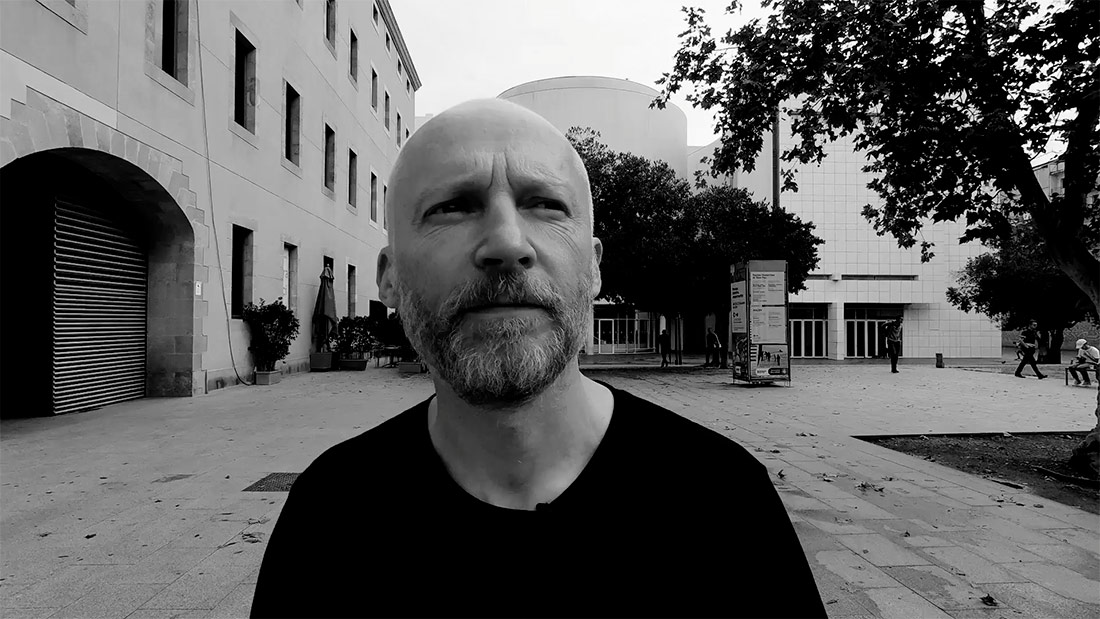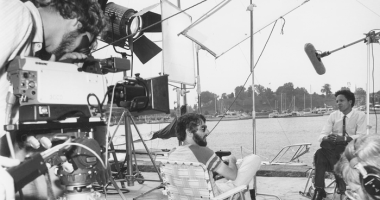Mathematics are a key language to understand the complex (and opaque) systems that make the world go round, be it economics, algorithms or AI. Marcus du Sautoy is a Professor of Mathematics at Oxford University and an impassioned science advocate of which he left evidence when attending the Biennal de Pensament Ciutat Oberta. In his own words, one thing that motivates him most is to research the unknown, for example, whether the Universe is infinite or not. We discussed about the limits of knowledge, of science and mathematics, ranging from scientific revolutions such as quantum theory to the impact of AI in our lives.
How can we possibly live with the impossibility of not knowing our surroundings? How can we accept this?
Do we need to accept that there are certain things we’ll never know? What we do need is never stop questioning ourselves. What we don’t know is, precisely, what prompts us humans to further our knowledge. As a scientist, it’s hard to assume and live with the unknown but having said that, what I do not know is what I find most exciting and what makes me get up every morning and try to get some answers. If I knew everything, life would be very boring.
What kind of things we may not know?
One of the questions for which we humans will never have an answer is whether the universe is finite. Nowadays we think it might be finite because it has no tangible boundaries and somehow, it’s locked in a close circuit. However, it could well be infinite and last forever. How could we find out? Einstein showed that light travels at a limited speed and, therefore, there’s only a portion of finite space which we can see at any given time. Behind that cosmic horizon, there’ll always be a beyond which we’ll never be able to see.
Do mathematics help understand the world?
There’s an interesting conflict between the abstract world and mathematics and the physical world of the universe. With mathematics it’s easy to make headway to the infinite with an algorithm: you add one, plus one, plus… and sooner or later you’ll reach the infinite. In the world of physics, however, we do not know if the infinite exists. In mathematics you can divide something as many times as you like but physics tell us this is not possible. When you try to divide matter, you reach a point called “Planck constant”, the smallest space unit there is, and we can’t find anything smaller. Contrary to mathematics, physics maintain that nothing can be turned infinitely small, therefore there’s a conflict.
And who’s right?
I believe that behind mathematics there’s the basis of anything in the universe. To look for a creator, we need something intemporal, that doesn’t need to create itself. Maths are truly intemporal because have always existed. The universe is a mere physicalized part of mathematics. People say that if God exists, he must be a mathematician but I’d say it the other way round: mathematics are God.
“People say that if God exists, he must be a mathematician but I’d say it the other way round: mathematics are God.”
How the human conscience works is probably one thing we’ll never know, however attention nowadays is already geared towards artificial conscience.
I think the role played by computers is one of the most fascinating elements of our generation. They aren’t mere tools that help us to do things. Already they are starting to challenge the very concept of humanity. Likely, the machines we are creating may end up being so sophisticated as to almost seem humane and interact with us. That’s why I’m so keen on AI.
So much so as to end up replacing humans?
AI will be able to drive cars, of course. And also do the work of physicians. The question is: will it be able to write music scores and novels? Can AI eventually become an artist? In my new book I’m trying to answer whether we’ll be able to create a code which may end up being as creative as humans are. What’s fascinating though is the fact that we humans have started to behave like machines, because we are stuck in our own way of doing things. Likely new technologies will allow us to perform not so much as machines and be more creative, because they’ll provide new ideas and challenges. An exciting future is ahead due to the fusion of human creativity and code creativity.
“It’ll be interesting when AI actually has a conscience because it’ll be able to explain what being a machine it’s like.”
Aren’t feelings and emotions required to create something?
In my opinion one of the great challenges is to ascertain whether AI will be able to generate its own emotional world. So far we know that AI is better than humans when it comes to ascertaining whether a person is faking a smile or not. No doubt with time AI is getting more sophisticated but it’ll only be really interesting when it’s able to generate its own internal world, its own consciousness. Why do humans write novels? I’d write a novel or paint a picture because I want you to understand my own emotional world, because I want you to share what’s in my head. I want you to feel what I feel. That’s why we write novels. That’s why it’ll be interesting when AI actually has a conscience because it’ll be able to explain what being a machine it’s like. Only then it’ll be worthwhile to read, to listen or to look at its creative world.
We’ll create machines able to write novels but we aren’t yet capable of understanding how the human mind works
The issue of conscience is something we may never unveil. I know what it means to be me, but not what it means to be you. How can I know, for instance, what you feel when you have pain? We both use the word pain and assume that when we use it, we are both describing what the other person feels. But it could be very different. It’s highly unlikely that one day we’ll be able to get into other people’s consciousness. Perhaps all of you around me are zombies and have no conscience and for that matter, I may be the only conscious person in the world. I don’t think that more technology would provide an answer to this. Furthermore, even if we assume that all humans are equals and equally conscious, what can we say about smartphones, for instance? They are so sophisticated that they might become conscious as well. How can I possibly know if it’s a real conscience or fake? When a phone claims to think at to be a phone, does it mean it’s conscious? I don’t think there’s a way to sort this out.

Conscience is one of the limits of human knowledge which Du Sautoy analysed in his last book. You also explore these limits in the play X&Y which you brought to Barcelona during the biennial Pensament Ciutat Oberta, inspired on a story written by Borges. Two characters inside a cube play with the tension existing between the infinite and finite nature of human beings, which prevents from absolute knowledge.
As a mathematician, Borges’ work has always inspired me a great deal. He wrote some wonderful stories and was fascinated by the same issues that fascinate me: what’s meant by space? Does the infinite exist? The notion of paradox. His approach, however, was not mathematical like mine because he used a literary language. What I like about Borges is that he used imagination and literature to explore the same problems that, as a mathematician and physicist, interest me.
Specifically, your play was inspired by the “Library of Babel”.
The “Library of Babel” tries to get answers to what the universe is. The word library actually refers to the universe and he wants to find out if the library is infinite.
And, if it is not infinite, does it have walls? And what’s beyond the walls? At the end of the story the solution he finds is the same that we mathematicians and physicists have found: the library is not infinite, it’s finite but shaped as a loop.
If you happen to take one of its corridors, in one direction, you end up at the beginning. Borges’ library is full of books. In fact, it houses all the books possible. There’s my book and the one I may write and all the others that I’ve already written. One could well think that this library houses everything but, come to think twice about it: it houses nothing. What counts is that people in the libraries have decided which books are worth reading and writing. Borges mentions a book in particular which describes all the others. It might well be the book we are all looking for. The Book. The book that can explain everything. We don’t know, however, whether the book exists.
“Such a vast array of possibilities may appear to be fascinating but an excess may simply end up in noise and then it’s impossible to hear anything.”
Is Internet the library imagined by Borges?
We live in a world of facts. Internet allows us to generate thousands of videos and pictures, however, no human being can check, for example, all the videos existing online about cats. And yes, we are all building some sort of a Library of Babel where absolutely everything is available but deep down, we have nothing unless a curator helps us move around such library. This is a very important role and authors and intellectuals have to help us navigate in order to find what we are looking for. Such a vast array of possibilities may appear to be fascinating but an excess may simply end up in noise and then it’s impossible to hear anything. We must find a way to move cautiously around this library in expansion which we are creating in Internet.
In fact, Borges has another story, “Funes the Memorious”, where the main character is able to remember absolutely everything although he’s not so good at thinking because thought is tantamount to generalization and abstraction.
On of the flaws that typify knowledge is the fact that the more we know, the more we realize there are things we don’t know anything about. As the horizon widens we find out that the scope out there is much wider than what we are actually capable to deal with. We are advancing fast, we are creating a great deal of new knowledge, but do we really understand better the universe or are we simply discovering that we cannot understand it?
Are we living a revolution?
The idea of revolution is very important in the scientific milieu. If we look back in History, we will see how we observe and understand the universe in a way, but then someone appears and throws the current statement into disarray. It is then when we discover that we hadn’t understood things. In science, such revolutions are memorable events.
Perhaps one day someone will turn up to tell us that this whole thing about the wave function collapse and a new probability of universe control is madness… Maybe we are about to witness a new scientific revolution which will truly transform our way to conceive the universe. I hope so!



JUAN GALÁN | 05 March 2019
Estimados, pensemos que los Universos tanto de la materia, como los Universos de la antimateria, son formaciones finitas; lo que debemos cuestionarnos, si procede desde está limitada visión del plano que habitamos, es si el espacio, como continente de los universos, es infinito o no…; de antemano les anticipo que…, a medida que se va poblando de universos, pareciera ser de constitución infinita… ; aprovecho para rogarles que escuchen y divulguen el ensayo sobre el viaje que nos lleva la Obra ÚNICO ESPACIO – VARIOS UNIVERSOS—https://www.ivoox.com/podcast-unico-espacio-varios-universos-obra-completa-d_sq_f1375450_1.html
Sara | 06 September 2020
El universo es infinito,ya te lo digo yo,que se de lo que hablo de escandalo.Te digo porque?pues porque un universo es lo ultimo que se construye para este materializarse con el infinito espacio ue hay en el cosmos.Algun problema?yo no veo ninguno.Cuando has vivido tanto y visto tanto y encima se es consciente,a lo tonto en este maldito universo,terminas recordandolo absolutamente cuanto necesitas saber,para llegar a desbloquermar tu cerebro por completo.Y el mio navega con muchisima fluidez
Carmen | 16 November 2020
Creo que nuestra mente no puede entender si el universo es finito o infinito.
Si fuera finito, ¿después que hay?
Si fuera infinito, nuestra mente siempre busca un límite.
Puede que sea infinito, pero no lo entiendo, ni creo que lo entienda nadie.
Carmen | 16 November 2020
Mi duda siempre ha sido de se el Universo es finito o infinito.
Si es finito, nuestra mente busca que hay detrás.
Si es infinito, nuestra mente siempre busca un límite.
Creo que es infinito, pero nuestra mente no puede entender esto.
Creo en la teoría de Einstein, nada es absoluto-todo es relativo.
Antes del big bang, que había? El concepto de la nada no lo entiendo.
Leave a comment